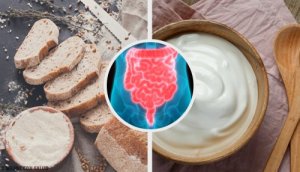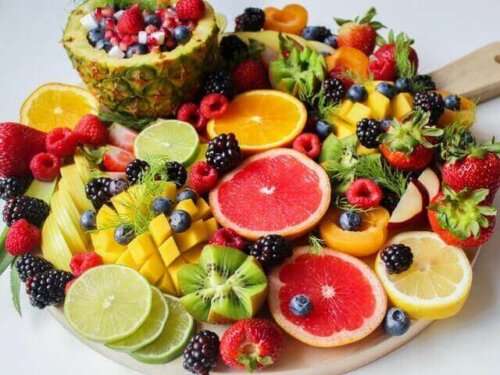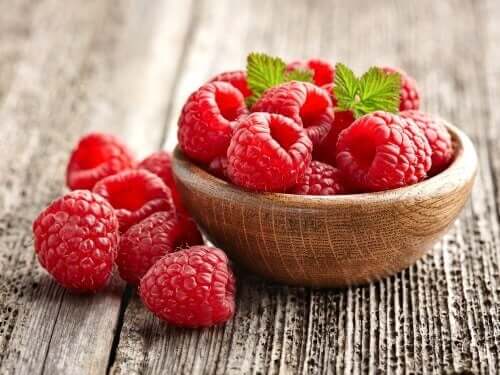Eat These Five Fruits for a Healthy Colon


Written and verified by the pedagogue in physical education and nutritionist Elisa Morales Lupayante
It’s scientifically proven that eating fruits every day is good for a healthy colon. Especially when you eat it in moderation as part of a balanced diet. But, could fruits also help purify organs such as the colon?
Some people believe that disease is a result of bad life habits and due to a lack of “cleansing” of organs such as the colon, kidneys, liver, among others.
Thus, they truly believe that the functions of the different organs could be supported and thus maintain their health through food. Or, rather, by the consumption of certain remedies. To this end, there are many recipes for this purpose out there, ranging from infusions and smoothies to full meals.
However, the organs of the body don’t need to be “purified” that way and that’s a proven fact. So, you don’t have to drink a lemonade every day or eat an apple a day to stay healthy.
Could you drink lemonade or eat a piece of fruit a day as part of a healthier diet? Indeed, but you must throw many other healthy life habits to the mix.
The best fruits for a healthy colon
Here are some of the best types of fruit that won’t only help you balance your diet, but will let you enjoy good quality of life.

1. Apples
Green apples, red apples… whichever you like. Don’t hesitate to start your mornings with a whole apple with the peel, for breakfast or snack.
- A raw apple is good against constipation.
- Baked apples are great for diarrhea because the cellulose they contain softens during cooking, which gives more consistency to stools.
- Apples are soothing, anti-inflammatory, and high in fiber, especially if you eat the peel. In addition, it is rich in pectin and antioxidants.
2. Papaya is great for a healthy colon
Papaya is a tasty fruit that pairs up well other types of food. In addition to aiding with digestion (due to its papain content), it helps improve intestinal transit.
3. Bananas
Eating a banana a day can also help you maintain good intestinal transit and good energy levels to be able to fulfill all your activities.
According to data from the Fundacion Española de Nutrición (FEN):
- Bananas are rich in potassium, an essential mineral for muscles throughout the body
- They contain inulin and other fructooligosaccharides not digestible by intestinal enzymes. These reach the final part of the intestinal tract and benefit your intestinal transit
- They’re also a source of vitamin B6, which contributes to the normal functioning of the nervous system
4. Watermelon
Even though this fruit isn’t particularly rich in nutrients, it contains a certain amount of potassium and lycopene. These two substances contribute to the good health of your body in general. Also, because it’s rich in water, watermelon can keep you hydrated and help you maintain proper intestinal transit.
Enjoy this fruit as often as you can, and read more as to why you should here: You’ll be Surprised by These Three Benefits of Watermelon
5. Raspberries

According to the FEN, raspberries contain protein, vitamin C, folates, phenolic compounds, antioxidants and, like apples, pectin. Thus, you must consume them to maintain a balanced diet and good intestinal transit.
Fruit helps balance your diet, provides energy, fiber, and many nutrients that contribute to your good health. But, they don’t “cleanse the colon” or any other organ in your body.
See more as to why apples are good for your health: 5 Benefits of Eating Apples
Keys to a healthy colon
Colon cleansing could be the starting point that motivates people to adopt healthier life habits. These can definitely provide real long-term benefits, especially, when it comes to food.
A healthy lifestyle is made of consistent habits. Each one of them improves your organism so everything in it functions as it should. Thus, eating well, hydrating properly, exercising daily, avoiding excesses and following the doctor’s instructions are all essential for your well-being.
To maintain a healthy colon, you must have a balanced diet. One in which the consumption of fiber-rich foods is present and the consumption of saturated fat is lower. In addition, you must drink plenty of liquids, especially water.
All cited sources were thoroughly reviewed by our team to ensure their quality, reliability, currency, and validity. The bibliography of this article was considered reliable and of academic or scientific accuracy.
- SOARES, Marcia et al. Avaliação da atividade antioxidante e identificação dos ácidos fenólicos presentes no bagaço de maçã cv. Gala. Ciência e Tecnologia de Alimentos, v. 28, n. 3, p. 727-732, 2008.
- DA SILVA OLIVEIRA, Daniela et al. Vitamina C, carotenoides, fenólicos totais e atividade antioxidante de goiaba, manga e mamão procedentes da Ceasa do Estado de Minas Gerais. Acta Scientiarum. Health Sciences, v. 33, n. 1, 2011.
- DUARTE-ALMEIDA, Joaquim Maurício et al. Avaliação da atividade antioxidante utilizando sistema β-caroteno/ácido linoléico e método de seqüestro de radicais DPPH. Ciência e Tecnologia de Alimentos, v. 26, n. 2, p. 446-452, 2006.
This text is provided for informational purposes only and does not replace consultation with a professional. If in doubt, consult your specialist.








